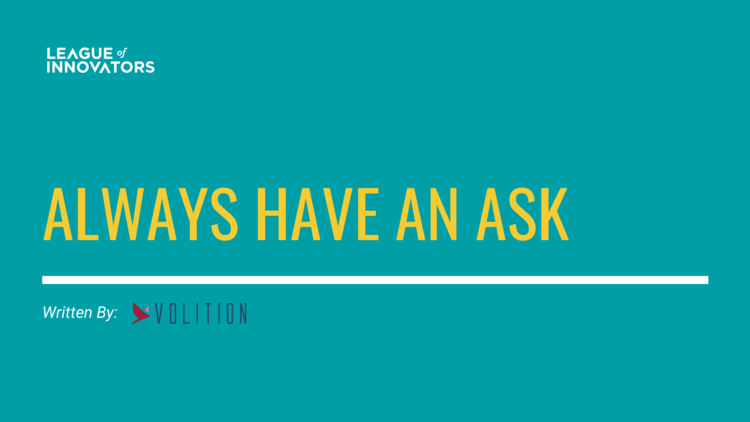
Over the past five years and 100 pitch events that we’ve hosted at Volition, there has been one key takeaway that persists across time, trends, and geographic boundaries. And that is: always, always, always have an ask.
This may seem obvious, but you’d be surprised how often it’s left out. The thing is, whether you’re a startup or in some form of growth stage, you always need something to support you in getting to your next milestone(s), regardless of if you are bootstrapping or raising funds.
Not having an ask, I’m convinced, is a product of two pervasive myths in entrepreneurship:
(1) that you have to do it alone, and
(2) that asking for help is a sign of weakness.
Building a startup requires a village, and asking for help if one of the key ingredients to increasing your chances of success--the earlier you learn how to do it, the better.
The Rule of Specificity
Too often we hear that founders have come up with a number for their ask based on the idea that, “it just sounds good,” and we have even had people ask us what number or ask they should make based on pitching norms. This generally means that the founder has not sat down to develop a plan or calculated what they really need; there is no indication of how the funds will impact the milestones or momentum of the company or how it impacts return on investment.
The ask, money or otherwise, has to be based on something real and quantifiable. We suggest that startups think about their needs in terms of MNM: Mentors →Networks →Money. You are always going to need one (if not all), and generally one follows the other.
Set aside time to sit down and map out:
- What are your key milestones over the next 1-1.5 years.
- What do you need in order to hit these milestones, i.e., assets, key people, and/or components (include costs + buffer).
- Develop a work back plan to assess what you really need, be it funding, introductions, beta customers that will allow you to hit those milestones and move the business forward in a meaningful way.
If you are not confident in your ask, find an advisor who can support you with this.
Learning how to ask for help, and being really intentional and specific with it, is one of the most common pieces of advice that we hear from later stage entrepreneurs and investors. It’s a skill that we unlearn over time (note: kids are quite good at asking for help!), and one that they need to practice developing.
But, as our Managing Partner, Paul Brassard says, “If you don't ask, you don't get. Don't be afraid to ask because the worst they can say is "no", but it may just be that they, or you, need to "KnoW" more before saying yes in the future.”
Struggling with your valuation? Check out this post from Volition Advisor, Amyn Somani, breaking down some of the common questions we heard about how to value your company. If you’re interested in talking through your strategic ask, fundraising strategy, or pitch, you can book Volition Advisor and Managing Partner, Paul Brassard here.
Meet the Author:
Melanie Ewan, Co-founder and Managing Partner, Volition
Canadian-born entrepreneur living in Ireland, Melanie Ewan is known for her work as a startup coach, professional writer, and advocate for gender equity in business and tech. Melanie is the Co-founder and Managing Partner of Volition, and also sits on the board of Women in Tech World, where she plays an active role as Lead Researcher and Facilitator of their community-based research initiatives to support and advance women in tech.
Connect with Volition!
Volition website: http://volitionadvisors.com/
YouTube (for AMA’s, Founder interview and live streamed events): https://www.youtube.com/channel/UCkyMjiYTmhQD5JVU8r8Ym6Q
Instagram: https://www.instagram.com/thisisvolition/
LinkedIn: Volition Advisors
